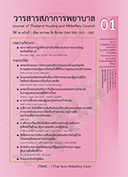Factors Predicting Family Caregiver's Strain from Care Activities for Bed-Bound Older Adults at Home
Keywords:
strain from caregiving activities, family caregivers, bed-bound older adultsAbstract
Objective: To examine factors capable of predicting caregivers’ strain caused by caregiving activities for bed-bound older adults at home
Design: Predictive research Methodology: Purposive sampling was performed to recruit a sample of 117 family caregivers aged 18 and higher who serve as primary caregiver for bedridden older persons. Data were collected between June and October 2019 using these instruments: 1) a demographic questionnaire; 2) a health perception questionnaire; 3) the Preparedness for Caregiving Scale; 4) the Mutuality Scale; 5) a Social Support Questionnaire; and 6) the Caregiving Activities Scale. The data were analysed using descriptive statistics, Spearman’s Rho correlation coefficients, and multiple regression analysis.
Results: Age, perceived income adequacy, health status, preparedness, mutuality, and social support could be jointly predicted caregiver role strain from caregiving activities for bed bound older adults with statistical significance by 31.9% (R2 = .319, F = 8.574, p < .05). The caregivers’ health status was identified as the most powerful predictor (Beta = -.285, p = .001), over the caregivers’ preparedness (Beta = -.254, p = .002), age (Beta = .220, p = .008), and adequacy of income (Beta = -.214, p = .014), respectively. On the other hand, mutuality and social support were unable to predict strain caused by caregiving activities for bed-bound older adults.
Recommendations: The findings of this study could be used by healthcare providers as a guideline for promoting family caregivers’ health and preparedness, for the purpose of reducing their strain from caregiving activities and enabling them to provide better care for older adults at home.
Downloads
References
Official Statistics Registration System. Statistic of the Thai elderly 2017 [internet]. 2017 [cited 2018 May 15]. Available from: http://www.dop.go.th/download/knowledge/ th1533055363-125_1.pdf (in Thai)
Department of Health. Long Term Care [internet].2018 [cited 10 Aug 20]. Available from: http:// ltc.anamai.moph.go.th/
Jitapunkul S, Kunanusoan C, Pooncharoen W, Suriyawongpaisal P. Health of Thai elderly. 1st ed.
Bangkok: Holistic publishing; 1999. (in Thai)
Ravi U. 7 Common health risk of a bed ridden patient. Patients Engage [internet].2017 [cited 2018 August 30], Available from: https://www.patientsengage.com/conditions/7-commonhealth-risks-bedridden-patient/
Intarasombat P, Monkong S, Churaitatsanee S, Vongterapak S, Prasanaikom W, Pronsawatchai P, et al.Comprehensive care of hospitalized older adults:transitional care from hospital to home. Ramathibodi Nursing Journal 2013;19(2):194- 205. (in Thai)
Janthayanont D, Srisuwan P, Wisetduangthum K, Weerapolchai K, Suwankanoknant J, Supajarupan T, et al. Attitude and caregiver burden from taking care of stroke patients in Phra Nakhon Si Ayutthaya District Phra Nakhon Si Ayutthaya Province. Journal of Preventive Medicine Association of Thailand 2011;1(1):58-65. (in Thai)
Burn C, Archbold PG, Stewart BJ, Shelton K. New diagnosis: caregiver role strain. Nurs Diagn 1993;4(2):70-6.
Paksee N, Sirapo-ngam Y, Monkong S, Leelacharas S. Effects of a transitional care program for stroke patients and family caregivers on caregiver’s preparedness, stress, adaptation, and satisfaction. Ramathibodi Nursing Journal 2016;22(1):65-80.(in Thai)
Boonvas K, Supanunt T, Chunhabordee A, Wae N. Caregiver stress and need in caring disabled. The Southern College Network Journal of Nursing and Public Health 2017;4(1):205-216. (in Thai)
Archbold PG, Stewart BJ, Greenlick MR, Harvath T. Mutuality and preparedness as predictors of caregiver role strain. Res Nurs Health 1990;13:375-384.
Petchroung N, Priyatruk P, Thongkeang V. The study of continuing care for patients with cerebrovascular
disease in primary care unit. Journal of The Royal Thai Army Nurses 2013;14(1):25-34. (in Thai)
Carter JH, Lyons KS, Stewart BJ, Archbold PG, Scobee R. Does age make a difference in caregiver strain? Comparison of young versus older caregivers in early-stage Parkinson’s disease. Mov Disord 2010;25(6):724-730.doi:10.1002/ mds.22888. Pubmed PMID: 20201024
Sutthilak C, Wirojratana V, Puwarawuttipanit W,Cheewakriengkrai L. Factors predicting health status on caregivers of elderly people with dementia. Journal of The Royal Thai Army Nurses 2018;19(1):191-200. (in Thai)
Trongsakul S, Lambert R, Clark A, Wongpakaran N, Cross J. Development of the Thai version of Mini-Cog, a brief cognitive screening test. Geriatr Gerontol Int 2015;15(5):594-600.
Jitapunkul S, Kamolratanakul P, Chandraprasert S, Bunnag S. Disability among Thai elderly living in Klong Toey slum. Journal of The Medical Association of Thailand 1994;77(5):231-8. (in Thai)
Faul F, Erdfelder E, Buchner A, Lang AG. Statistical power analyses using G*Power 3.1: Tests for correlation and regression analyses. Behav Res Methods 2009;41(4):1149-60.
Cohen J. Statistical power analysis for the behavioral sciences [2nd ed.]. New York: Lawrence Erlbaum Associates.
Piaseu N, Mitchell P. Household food insecurity among urban poor in Thailand. J Nurs Scholarsh 2004;36(2):115-121.
Wirojratana V. Development of the Thai Family Care Inventory [Doctoral dissertation]. Portland:Oregon Health & Science University;2002.
Kaveevivitchai C. Relationships among selected factors, uncertainty in illness, social support and adaptation in breast cancer women receiving chemotherapy. [Master degree]. Bangkok: Mahidol University; 1993. (in Thai)
Hanucharurnkul S. Social support, self-care, and quality of life cancer patients receiving radiation in Thailand [Doctoral dissertation]. Wayne State University;1988
Schaefer C, Coyne JC, Lazarus RS. The healthrelated functions of social support. J Behav Med 1981;4(4):381-406.
Archbold PJ, Stewart BJ. Family Caregiving Inventory [Unpublished manuscript]. Portland:Oregon Health
Sciences University;1986.
Samartkit N, Kasemkitvattana S, Thosingha O, Vorapongsathorn T. Caregiver Role Strain and Rewards: Caring for Thais with a Traumatic Brain Injury. PRIJNR [Internet]. 2010 [cited 2020 Jan 29];14(4):297-14. Available from:https://
he02.tcithaijo.org/index.php/ PRIJNR/article/view/6267
Longphasuk N, Monkong S, Sirapo-ngam Y. Health conditions and self-care activities of older caregivers caring for bedridden older adults. Thai Journal of Nursing and Midwifery Council 2018;33(2):97-109. (in Thai)
Songwattanayut W. The study on the influences of mutuality, predictability of caregiving and personal
factors relating to strain from direct care of patients with cerebrovascular disease on family caregivers.
[Master degree]. Bangkok: Mahidol University; 2002.
Suksiri N, Raluk P, editor. 10 things about National Health Security Rights [internet]. 1st ed. Bangkok: National Health Security Officer; 2013 (in Thai)








